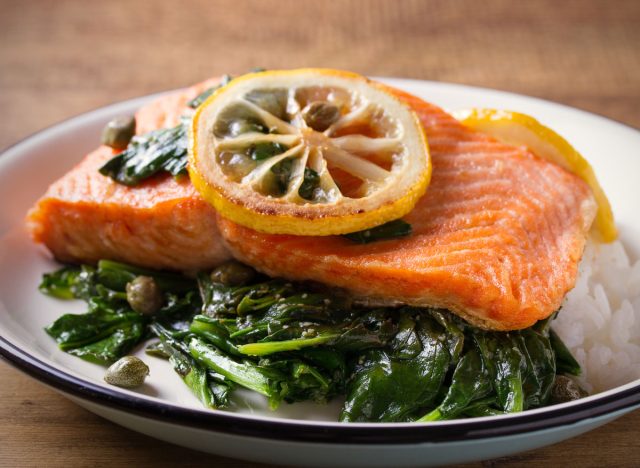7 Science-Backed Benefits of Eating Salmon

Whether it’s chopped up in a poke bowl or grilled to perfection alongside some fresh asparagus, salmon can be a delicious and healthy fish to enjoy any time of year. If you’re a lover of salmon, or any fish for that matter, chances are you’ve heard a lot of talk about possible salmon benefits related to your health. But, is there scientific evidence to back up these conversations?
Before we get into the research-based benefits of eating salmon, let’s quickly discuss the two main types you’ll see when you’re in the grocery store: farm-raised and wild-caught. While wild-caught is sourced from rivers and the ocean, farm-raised means the salmon was bred on a fish farm, which the United Nations predicts will provide about two-thirds of the world’s sold fish by 2030. Farm-raised is often cheaper, but both types of salmon are very similar when it comes to their nutritional value and both can benefit your health in a number of ways.
Read on to learn the health benefits of salmon. Then, for more healthy eating tips, make sure to check out The 12 Healthiest Fish You Should Be Eating—and 3 To Avoid.
1. You’ll get a boost of high-quality protein.
If you’re not getting enough protein in your daily diet, you may want to start fixing that. Protein is necessary for weight loss, muscle building, boosting metabolism, and reducing cravings. In order to ensure you’re getting enough protein on a daily basis, a study from the Annals of Nutrition & Metabolism suggests getting about 20 to 30 grams per meal you eat.
The good news for salmon lovers is that a 3-ounce serving of wild salmon has about 21 grams of complete protein. Wild-caught and farmed are both high in protein, but wild-caught (21.6 grams) has a bit more than farmed (17.3 grams).
2. The selenium in salmon may support thyroid health.
Another great salmon benefit is that this flavorful fish is extremely high in a trace mineral called selenium, carrying about 70% of your daily recommended value per serving. But what does this mineral do? Among other benefits related to your heart and cognitive health, selenium is necessary for a healthy thyroid.
According to the National Institute of Health, the thyroid is the organ in your body that holds the highest concentrated levels of selenium, and a report published in Molecules states that selenium is necessary for the function of your thyroid. Not only that, but a review published in Nature Reviews says that those who are deficient in this mineral may increase their risk of hyperthyroidism —a condition caused by an excess of thyroid hormones.
3. You’ll get plenty of vitamin B12.

Have you ever felt extremely tired and lethargic, only to have someone recommend a B12 supplement to you? This is because vitamin B12 is an essential nutrient in maintaining a healthy system of nerve and blood cells in our body.
When we are deficient in B12, we may experience weakness, weight loss, and even depression. And according to the National Institute of Health, we need B12 to help prevent megaloblastic anemia, a blood problem that can lead to lethargy and exhaustion.
Because our body can’t store its own B12, we have to get this vitamin from food or supplements. The good news is that salmon is overflowing with vitamin B12. To put it in perspective, the daily recommended intake of B12 is 2.4 micrograms, and there are around 2.38 micrograms of B12 in a 3-ounce fillet.
4. You may improve your heart health.
Omega-3 fatty acids are extremely beneficial for maintaining a healthy heart. You can find plant-based omega-3s (ALA) in foods like flaxseeds, chia seeds, and certain nuts, but fish are the best sources of the most bioactive forms of omega-3 fatty acids EPA and DHA! Salmon is one of the richest sources with around 2,260 milligrams of omega-3s per 3.5 oz. filet.
According to Circulation, omega-3 fatty acids help our heart by lowering our triglyceride levels (fat that is carried in our blood) and increasing our body’s “good” cholesterol levels, which decreases our risk of heart disease.
5. You might reduce inflammation.
Chronic inflammation in our body can lead to a number of health issues like heart disease, diabetes, and chronic pain. Thankfully, the omega-3 fatty acids found in salmon and other fatty fish have been linked to reducing inflammation.
According to a report from Biochemical Society Transactions, EPA and DHA (two types of omega-3 fatty acids) can have anti-inflammatory effects in our cell membranes. Omega-3’s in the form of supplements even yielded positive anti-inflammatory results in some patients with rheumatoid arthritis.
6. You may improve your brain health.

Fatty fish like salmon can possibly improve our brain health and even slow cognitive decline as we age. A study of Chinese adults from the Journal of Nutrition found that the powerful nutrients in fish (including salmon) like vitamin D, vitamin B, magnesium, and selenium, can have a positive impact on cognitive function.
Of the participants who were above the age of 65, those who consumed fish more than once a week saw better brain improvement than those who consumed less than one serving of fish per week.
7. Salmon contains astaxanthin, a powerful antioxidant.
Salmon gets its natural pinkish/red color from a chemical compound called astaxanthin. This is a naturally occurring pigment that is also an antioxidant with tons of health benefits.
According to a review published in Marine Drugs, astaxanthin has been linked to having anti-inflammatory properties, as well as positive impacts on reducing the risk of certain cancers and diabetes. In particular, wild-caught salmon is known for having a high amount of astaxanthin.
A 2005 study from the Asian Journal of Andrology even found positive results on male fertility and sperm velocity after being given a trial of astaxanthin.
A previous version of this story was published on August 26, 2021. It has been updated to include additional copy and proofreading revisions, additional research, and updated contextual links.
- Source: https://www.ncbi.nlm.nih.gov/pmc/articles/PMC7539343/
- Source: https://www.ncbi.nlm.nih.gov/pmc/articles/PMC6566799/
- Source: https://www.ncbi.nlm.nih.gov/pmc/articles/PMC4258944/
- Source: https://www.ncbi.nlm.nih.gov/pmc/articles/PMC6179508/
- Source: https://www.ncbi.nlm.nih.gov/pmc/articles/PMC6492513/#:~:text=Considering%20a%20coefficient%20of%20variation,respectively%20(Table%20%E2%80%8B1).
- Source: https://www.hsph.harvard.edu/nutritionsource/selenium/
- Source: https://ods.od.nih.gov/factsheets/Selenium-HealthProfessional/#h12
- Source: https://www.ncbi.nlm.nih.gov/pmc/articles/PMC8658851/
- Source: https://www.nature.com/articles/s41574-019-0311-6
- Source: https://ods.od.nih.gov/factsheets/VitaminB12-Consumer/#
- Source: https://fdc.nal.usda.gov/fdc-app.html#/food-details/175168/nutrients
- Source: https://ods.od.nih.gov/factsheets/Omega3FattyAcids-HealthProfessional/
- Source: https://fdc.nal.usda.gov/fdc-app.html#/food-details/175168/nutrients
- Source: https://www.ahajournals.org/doi/full/10.1161/CIRCULATIONAHA.114.015176
- Source: https://pubmed.ncbi.nlm.nih.gov/29467962/
- Source: https://portlandpress.com/biochemsoctrans/article-abstract/45/5/1105/66243/Omega-3-fatty-acids-and-inflammatory-processes?redirectedFrom=fulltext
- Source: https://www.ncbi.nlm.nih.gov/pmc/articles/PMC4162477/
- Source: https://www.mdpi.com/1660-3397/12/1/128
- Source: https://pubmed.ncbi.nlm.nih.gov/16110353/









